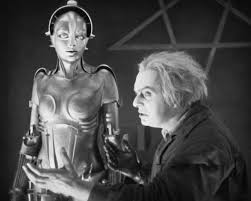
Why are there so few genuine utopias in
science fiction cinema?
By: Langdon Winner
(This is a talk I gave at a panel on science fiction at
the conference of the Society for Social Studies of Science, Copenhagen, October
19, 2012.)
Ray Bradbury, one of the celebrated founders of modern
science fiction writing, once observed, “People ask me to predict the future,
when all I want to do is prevent it.”
What are we to make of this sage, but gloomy comment?
A couple of years ago I began teaching an undergraduate
course at my university, Science Fiction Cinema and Social Criticism. Several undergraduates had spoken to me about
the idea, suggesting a seminar where they could draw upon science fiction
movies as an opportunity to speculate about humanity’s prospects. It turns out that for many college students, men
and women, science fiction serves as a window into philosophical
reflection. This happens at a time in
which opportunities of that kind are quickly vanishing. On my campus, for example, the philosophy
department has morphed into a Department of Cognitive Science, a field that has
about as much philosophical imagination as a washing machine manual.
The class I eventually offered asks students to read books
that shed light upon issues in both classic and contemporary sci-fi movies. We start with Fritz Lang’s “Metropolis,”
reading Marx and Engels The Communist
Manifesto,” along with several short pieces of 1920s German philosophical
writing on the decadence of industrial society.
From there we move to “The Day the Earth Stood Still,” punctuated by
readings from post-World War II nuclear scientists. Eventually we arrive at an encounter between
“The Truman Show” and Chris Hedges’ Empire
of Illusion as a way to feature the unsettling tensions between fantasy and
reality in today’s America. Without
going through the whole list of topics, it should be clear what the course
tries to do. As you’ve noticed, I
construe the category “science fiction” very broadly, trying to match it with
texts I hope the students will find challenging. Old-fashioned scholar that I am, during the
term I quietly celebrate as student papers show increasing attention to ideas and
arguments in the books and gradually de-emphasize the plots, characters and
images in the movies.
After the first experimental version of the course, I
looked back over the syllabus and noticed a disturbing fact. All of the films in the course from “Dr.
Strangelove” to “1984” “Blade Runner” and others were in a key signature of
dystopia or post-apocalyptic landscape.
Since I don’t want to burden my students with any more gloom and
foreboding than they already have, I decided to look for some optimistic,
hopeful, forward looking, pieces of science fiction, if nothing more than as a of
a change of pace. It’s not that I don’t
like the dreary tales of dystopian sci-fi; I enjoy spectacles of villainy, conflict,
collapse, and technology run amok is much as the next guy. But I thought it would be useful to offer a
little contrast and to expand the horizons of debate.
It should be clear that science fiction is not a field of
professional expertise for me. I’m not
really an avid fan of the genre, not a scholar who studies its written or
cinematic history in detail. Hoping to
find some guidance, I asked a number of friends, including Michael Bennett (law
professor, sci-fi enthusiast and organizer of this panel), people more heavily
involved in this area of inquiry, to suggest films or videos I could show that
are utopian in the sense that they project a better world, one in which people
live long and prosper. I was surprised
to find that my friends and colleagues had few if any suggestions. A common response was that are several
episodes from the Star Trek television series, both first and second generations,
that depict space explorers in encounters with arguably superior civilizations
out in the far galaxies.
But as I previewed some of the programs suggested, all seemed
pretty thin. None offered a strongly utopian
vision with enough substance to inspire a good discussion about possibilities
for creating a better world. I also
began to read scholarly books and articles that seemed to offer some guidance, Peter
Paik’s formidable From Utopia to
Apocalypse: Science Fiction and the Politics of Catastrophe, for example. But unless utopia means an imagined
alternative society minus the expectation that the place will be ideal or at
least improved over ones know previously, scholarly studies of this kind,
including Paik’s, actually explore grim dystopias, not hopeful utopian works of
writing and cinema.
So I began to wonder:
Why is this so? What is the reason for the dark, dreary tone
of so much of science fiction, especially in the movies?
The question presupposes an obvious fact, namely that the
story of progress in modern history and its associated narratives – growth,
development, innovation, and the like have all been triumphalist in tone and
content. Better science = better
technology = improved human wellbeing. Lift
your glass! Early modern utopias, from Francis
Bacon’s New Atlantis well into the
nineteenth century, often described imaginary, vastly improved societies,
Edward Bellamy’s Looking Backwards,
for example. Works in this tradition
suggested that science fiction writing would play a formative role to help
readers envision a substantially improved world and to take the steps toward
realizing it. Bellamy’s book actually
inspired a small social movement that set out to build the new model of
industrial society his novel outlines.
In twentieth century sci-fi, however, especially in the
movies the dominant themes are almost never visionary in a positive sense. The themes that rise to prominence are one of
dread, monstrosity and calamity, all of which can be quite entertaining. A typical story shows the origins and
consequences of a deliberate or inadvertent misapplication of the power of
scientific technology. That often serves
as the fundamental backdrop through which individual characters in the drama
find ways to triumph, finding love, honor, dignity – often as a saving remnant
that foreshadows a new beginning.
The dystopia depicted in “Gattaca,” for example, finds the
genetically inferior Vincent Freeman (hint, hint) struggling to slip through
the cracks of an inegalitarian political regime based upon biotechnology. After a series of close calls heroic
maneuvers, he finally succeeds in his dream, boards a rocket ship and blasts
off to the moons of Saturn. In one
variant or another, this has become the standard format of sci-fi movies over
the decades: individual solace is achieved on a background of monstrosity,
futuristic warfare, dystopian social organization, and apocalypse.
There are obviously good reasons why filmmakers prefer to
draw upon this familiar conceit. The
ominous problems described by science fiction offer dramatic tensions and
conflicts that can be explored and resolved in 90 minutes of film. If handled with any imagination at all,
climaxes in such settings can be vivid, exiting and even uplifting. The all-too-predictable sentiment is
(especially in American science fiction movies) that there will always be good
people among us even as society goes systematically nuts and the world falls
apart. If nothing else, such scripts are
reliably good box office.
One reason I generally avoid new sci-fi films is that this
tried and true, sometimes engaging format is supported by cinematic
spectacles -- shootouts, chase scenes, massive
explosions, and eye-popping special effects -- as directors throw in the towel
and abandon any interesting ideas they may have had earlier, preferring to fill
the screen with bombs and fire. It’s probably
a good thing that Philip K. Dick did not live to see the usually tawdry
cinematic adaptations of his wonderful stories. As they dissolve into a barrage of dazzling
visuals and loud noise, the challenging ideas from Dick’s fertile imagination
are simply overwhelmed.
Why are science fiction movies fashioned in such dark hues
rather than other colors on the theatrical pallet? It cannot be solely because directors and
producers need to sustain dramatic tension. Shakespeare wrote dramas not only in the mode
of tragedy that explored the dark recesses of the human hearts and minds, but
also in the mode of comedy in which key conflicts are generated by well-meaning
characters tripped up by mistaken identities, magical spells, and absurd
machinations all of which are eventually resolved to the benefit and delight of
all (or most) of those involved. I’m not arguing that science fiction writers
need to draw upon genius at Shakespeare’s level, only that there are good
alternatives in comedy, romance and fictionalized history that have served well
in genres other than science fiction.
Why, I wonder, are there almost no amiable sci-fi
comedies? Yes, there are some marvelous
films of dark humor. “Dr. Strangelove,”
for example, is a send-up the bizarre rationality of Cold War militarists and
intellectuals in the Pentagon and Rand Corporation. One could also mention Woody Allen’s “Sleeper,”
a gracefully amusing tale of a gadget filled dystopian future, an absurd mirror
of 1960s America. One can also mention also
the tender mercies and comic predicaments in Robin Williams robot romance
“Bicentennial Man.” But none of these
are utopias in the sense of projecting a better world for human living structured
around new scientific knowledge and superior technology. The best we ever get is dystopia with a broad, menacing
smile.
Of course, it may be that my question here simply defines
a void. The simple fact may be that for
whatever reason, the writers have not written the stories and the filmmakers
have not made the movies that imagine a world superior in its practical moral
qualities than the one in which we live today.
Science fiction, especially the lineage of science fiction cinema, seems
lodged permanently in the heart of darkness.
I find that puzzling and rather sad.
There are, however, some very good possibilities for
stories ahead. Not since the Mad Max
series of three decades ago have we seen any ingenious science fiction movies
about a fairly certain prospect just around the corner, that modernity’s great global
technosphere, one largely based upon a one time bubble of cheap petroleum, will
crumble as that puddle dries up.
By the same token, Hollywood has not yet fully acknowledged
a scenario strongly projected in piles of scientific reports on climate crash,
namely that worst case projections are becoming most probable outcomes,
pointing to a world in which temperatures spiral out of control, rendering large
portions of the Earth uninhabitable. Perhaps
movie makers are, like those in Washington D.C., still reassured by the vaguely
comforting term “climate change” and the belief that, hey, there’s still plenty
of time to do something.
Similarly, film makers have not come terms with a
situation revealed by recurring social upheavals in recent years, including the
May 15 movement in Spain and the Occupy Movement in the US, a situation in
which visions of modern democracy premised on a science and technology based
prosperity for everybody everywhere, has (by all statistical measures) been replaced
by staggering levels of inequality, accompanied by blatant forms of oligarchy –
government of, by and for the 1%.
Perhaps the good news is that, whether as tragedy or dark
comedy, there are still many good scripts to be written. But imaginings of a true utopia? That now seems completely beyond our reach.
* * * * * * * * * * * * * * * * * * * * * * * *
Note: A full
syllabus for the most recent version of my Science Fiction Cinema and Social
Criticism course appeared in a posting here last fall.







